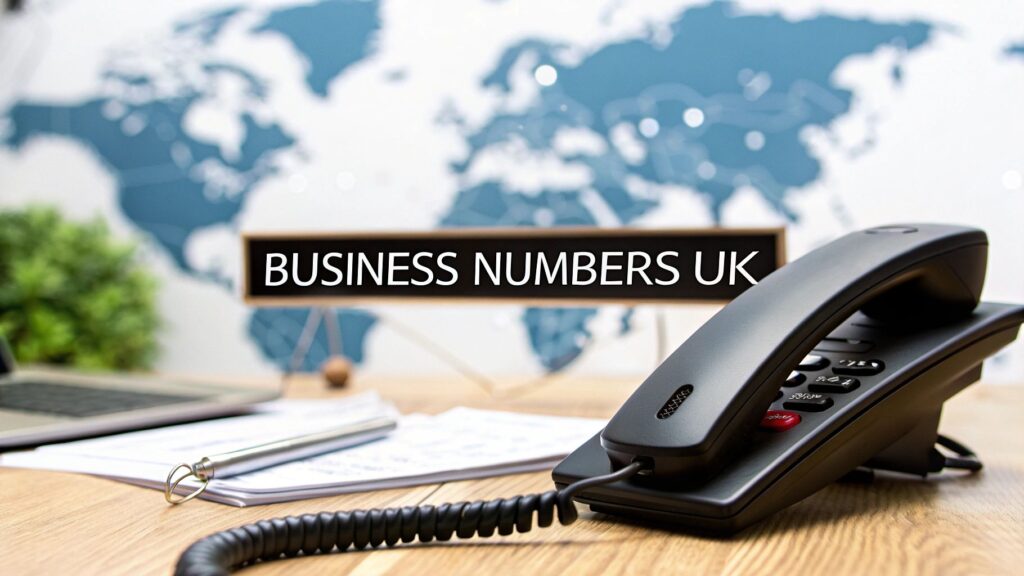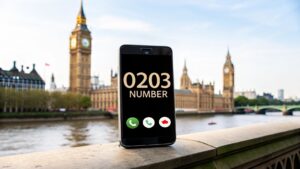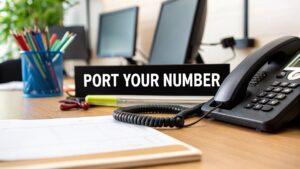A UK business phone number isn't just a string of digits; it’s a powerful tool that helps build your brand's credibility and professional image from the very first glance. The number you choose can say a lot about your business, whether you opt for a local, familiar number (like 0161 for Manchester) or a national one (like 0330) to signal a UK-wide presence.
Your Phone Number Is Your Digital Handshake
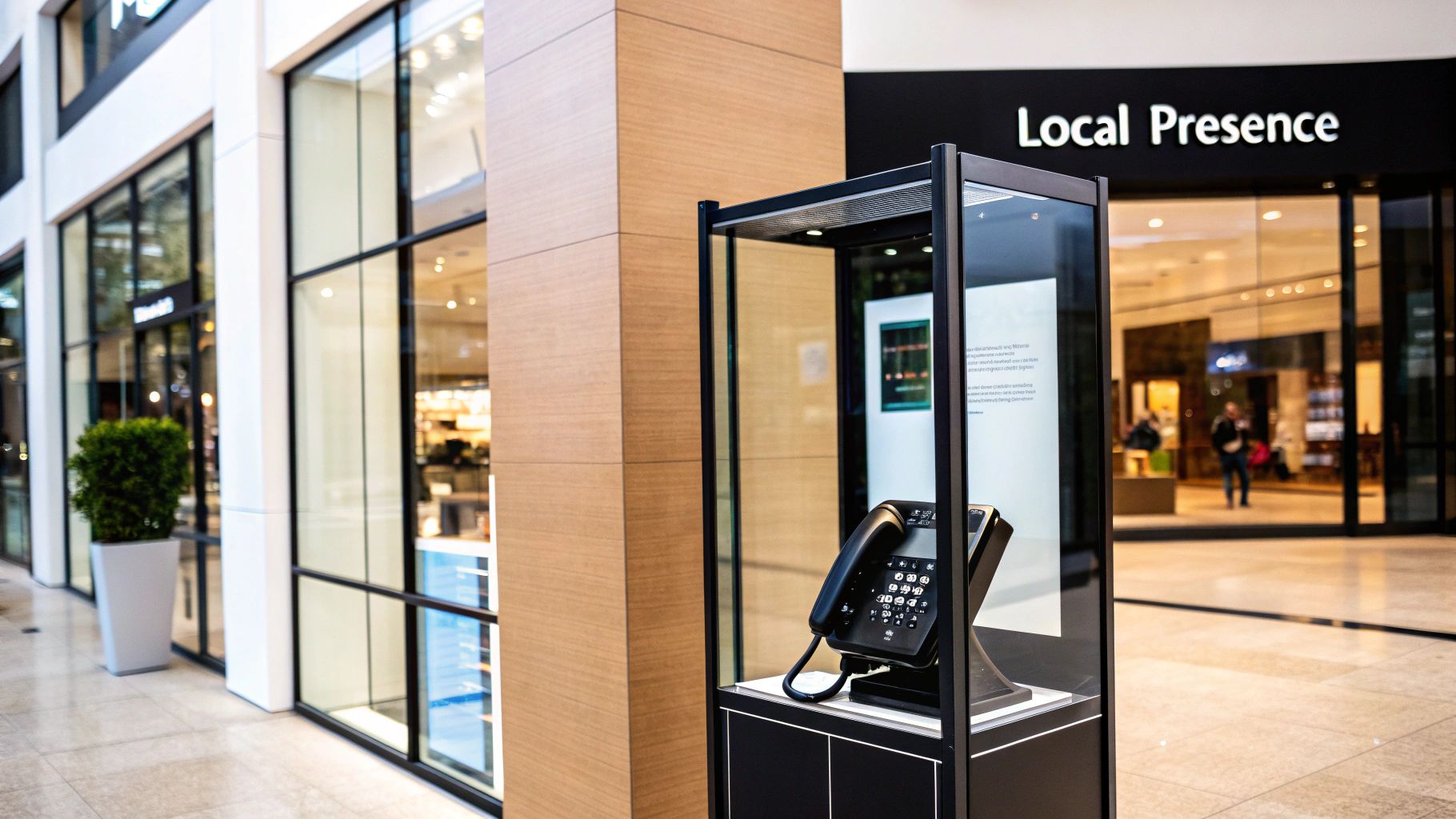
Let's be real—your business phone number is much more than just a way for people to reach you. It's your digital handshake. Long before you even say "hello," it's already shaping a customer's perception of your professionalism and trustworthiness.
Relying on your personal mobile number might seem convenient at first, but it blurs the line between your work and private life. Worse, it can make your business feel like a side hustle or a temporary venture. A dedicated business number, on the other hand, immediately tells customers you're established, serious, and ready to do business properly.
Building Trust Through Your Number
The type of number you pick sends a strong, subconscious message. A local geographic number, for example, can make your business feel like an accessible, friendly neighbour. This is a huge advantage if you serve a local community, whether you're a tradesperson, a local shop, or a regional service provider.
This isn't just a gut feeling; the data backs it up. According to figures from Ofcom, businesses using local geographic numbers (starting with 01 or 02) can get around 27% more calls from customers in their area compared to those with national numbers. With research from Callin.io showing that 67% of UK customers still prefer to phone a business, having the right number is clearly essential.
Think of it this way: a local number is like having a high-street shopfront, even if you work from a home office. It builds immediate familiarity and trust.
On the flip side, a national number (like an 0330 prefix) suggests a larger, UK-wide operation. This is perfect for e-commerce brands, national consultants, or any company wanting to appeal to customers no matter where they are in the country.
A Quick Guide to UK Business Number Types
To help you decide, here's a quick breakdown of the main types of UK business phone numbers and what they're best used for.
| Number Type (Prefix) | Best For | Customer Perception |
|---|---|---|
| Geographic (01, 02) | Local businesses, tradespeople, regional services. | Local, trustworthy, and community-focused. |
| National (03) | E-commerce, consultants, UK-wide companies. | Professional, established, and not tied to one location. |
| Freephone (0800, 0808) | Customer service, sales lines, charities. | Customer-friendly, encourages calls, reduces barriers. |
| Premium Rate (084, 087, 09) | Competitions, support lines (with caution), voting. | Costly to call; use is now heavily regulated. |
Choosing the right number sets the foundation for how customers see you.
What’s Next? Exploring Your Options
Getting to grips with the different kinds of business phone numbers UK companies can use is the first step. Each serves a different purpose and projects a unique image. This guide will walk you through everything you need to know, making sure you find the perfect fit for your business. We'll explore:
- Geographic Numbers (01/02) for that familiar, local feel.
- National Numbers (03) to create a professional presence across the UK.
- Freephone Numbers (0800/0808) to make it completely free for customers to call you.
- Virtual Numbers that offer incredible flexibility for modern, agile businesses.
Decoding Geographic vs Non-Geographic Numbers
Choosing the right kind of business phone number can feel like trying to crack a secret code. You're presented with a jumble of prefixes—01, 02, 03, 0800—and each one sends a completely different signal to your customers. Let's cut through that confusion and help you make a confident choice.
Think of your phone number as your business's digital address. Just as a physical address can suggest a local high-street shop or a major national headquarters, your number's prefix tells a story about your business before anyone even says "hello."
This visual breaks down the different types of business phone numbers you'll come across and how they're grouped.
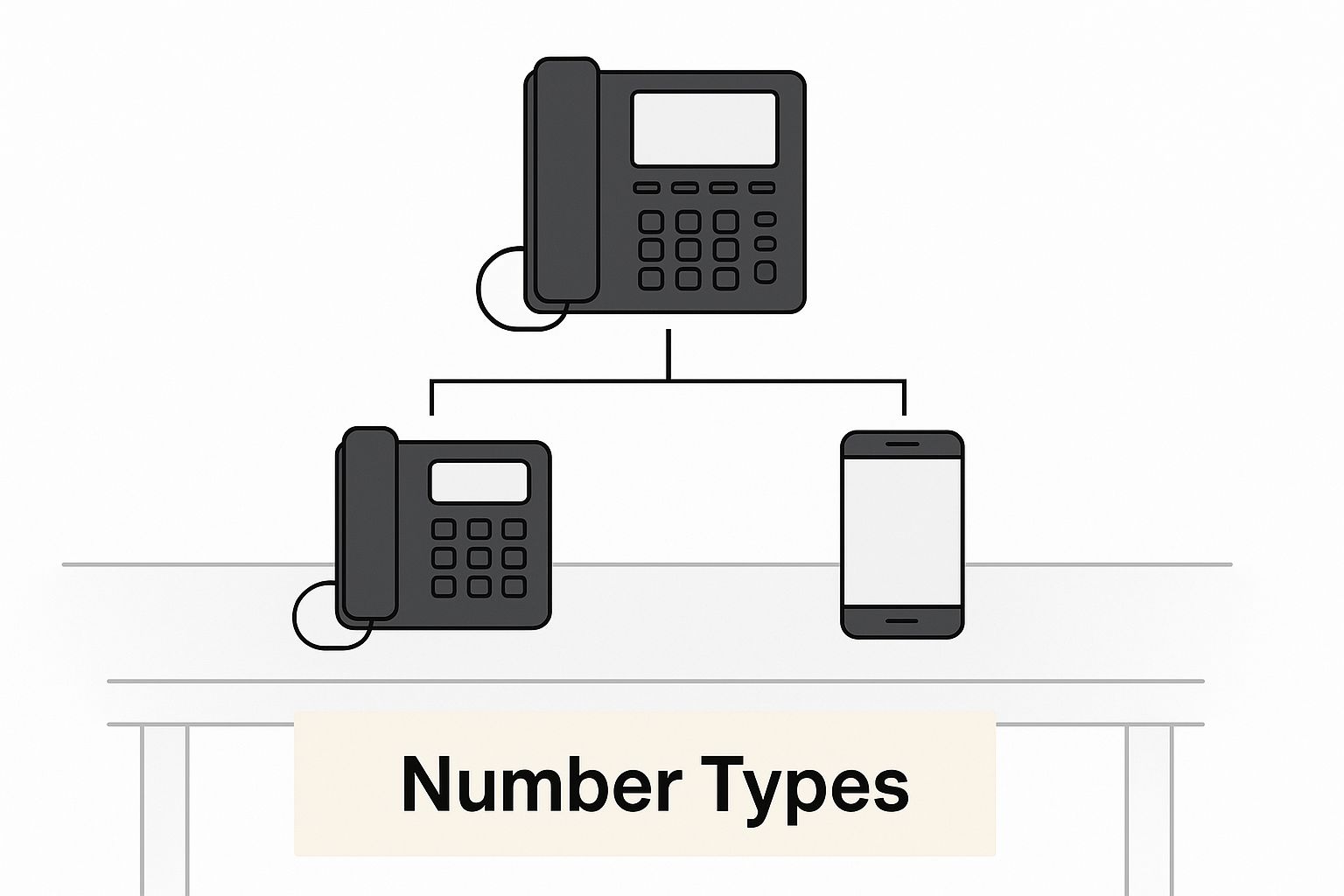
As you can see, all numbers fall into either the geographic or non-geographic camp. Understanding this fundamental split is the first step to picking the right one for you.
Geographic Numbers: The Local Champion
Geographic numbers are the ones we all recognise instantly. They begin with 01 or 02 and are hard-wired to a specific UK town, city, or region. For instance, an 0161 number screams Manchester, while an 020 number is unmistakably London.
Using a geographic number is like putting up a sign for a local shop. It immediately anchors your business in a community, creating a powerful sense of familiarity and trust. For customers who make a point of supporting local businesses, seeing that local area code can make all the difference.
This is especially effective for businesses serving a specific patch:
- A plumber in Bristol with an 0117 number.
- A bakery in Edinburgh with an 0131 number.
- A solicitor in Birmingham with an 0121 number.
It’s a clear message to locals: "I'm right here with you." That alone can make them more likely to pick up the phone. Even if you're working from a home office, a local number gives you an established presence in your target area.
Non-Geographic Numbers: Your Nationwide Presence
Non-geographic numbers, on the other hand, aren't tied to any single location. They paint a picture of a national business, open to customers from all corners of the UK. This is the perfect choice for e-commerce sites, national consultancies, or software companies that aren't defined by a single postcode.
Within this category, there are a few key types, and each has its own strategic use.
The Professional Standard: 03 Numbers
Numbers starting with 03 (like 0330 or 0345) are a brilliant way to project a professional, nationwide image. The real win for your customers is that calls to 03 numbers cost exactly the same as calling a standard geographic (01/02) number.
Crucially, this means these calls are included in the bundled minutes that come with most UK mobile and landline contracts. So, for a huge number of your customers, calling you won't cost them a single extra penny, which removes a common reason for hesitation.
An 03 number gives you the best of both worlds: a professional, national feel without the high call costs of some older 08 numbers. It's really become the modern standard for UK-wide businesses.
The Ultimate Sales Tool: 0800 and 0808 Numbers
Often called Freephone numbers, prefixes like 0800 and 0808 are the gold standard for customer-facing lines, particularly for sales and support. As the name implies, they are completely free for anyone to dial from any UK landline or mobile.
By offering a Freephone number, you remove every conceivable cost barrier for a potential customer to get in touch. Yes, the business owner pays a small per-minute fee to receive the call, but that's often a tiny investment when it leads to a valuable new client or a happy, loyal customer.
Consider using a Freephone number for:
- Your main sales enquiry line to maximise the number of incoming leads.
- A customer support hotline to show you truly value your customers' experience.
- Marketing campaigns where you want to prompt an immediate response.
In the end, choosing between geographic and non-geographic numbers all comes down to your business strategy. Do you want to be the trusted local expert, or the go-to national provider? Answering that one question is the first, most important step toward finding the perfect phone number for your UK business.
How Virtual Numbers and VoIP Set Your Business Free
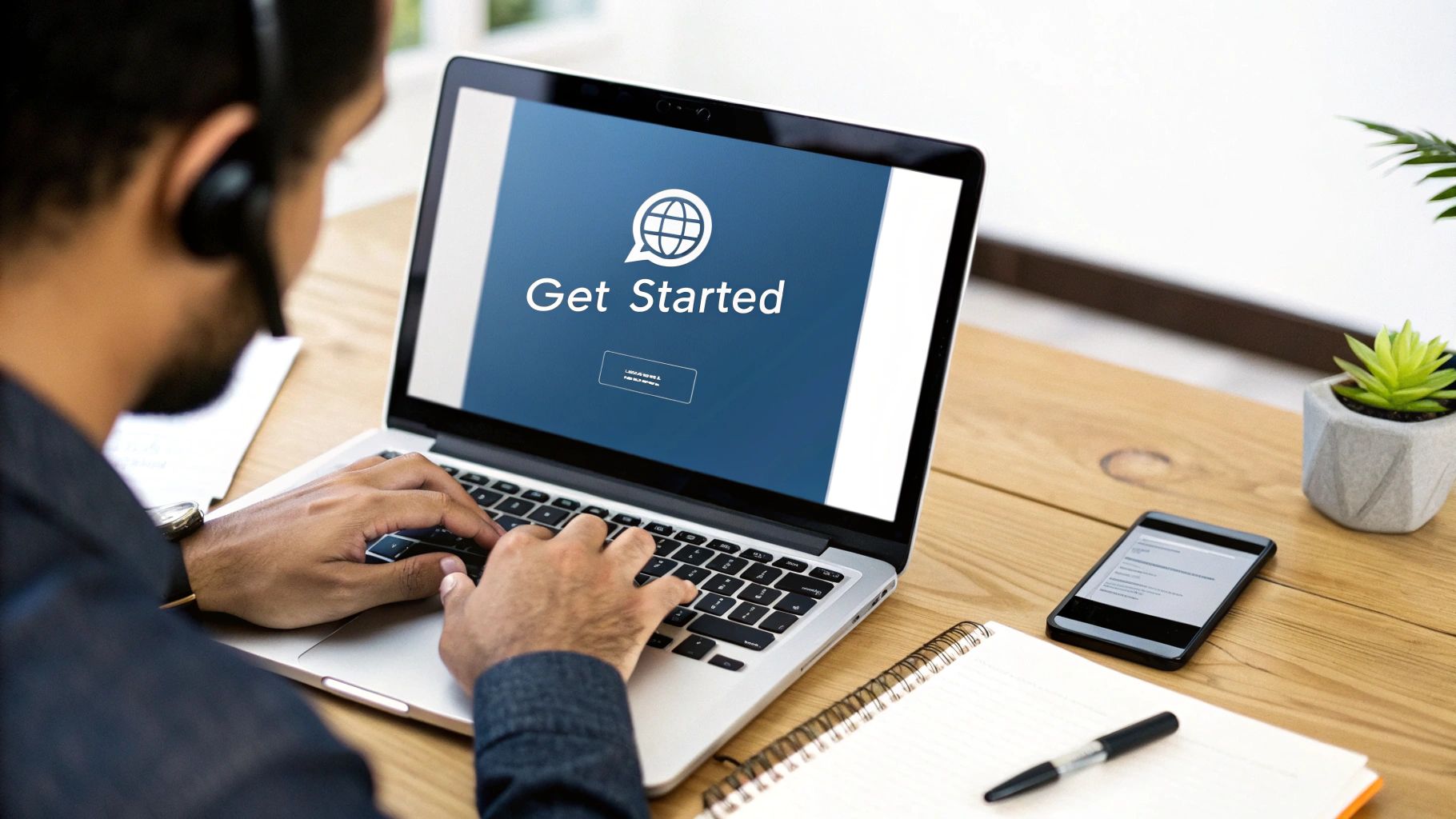
Imagine your business phone line wasn't chained to a specific desk in a specific office. What if it could follow you anywhere, from your home office to a coffee shop, or even on holiday? This is the powerful freedom that modern business phone numbers UK providers offer through virtual numbers and VoIP technology.
These two concepts work together to completely untether your business communications from a physical location, making your entire operation far more agile and responsive. Let's break down how they do it.
What Is a Virtual Phone Number?
Think of a virtual number like a smart, digital PO Box for your phone calls. Just as a PO Box gives you a professional mailing address that isn’t your home, a virtual number gives you a professional phone number that isn’t tied to one specific telephone line. It’s a number that exists “in the cloud.”
When someone dials your virtual number, you get to decide exactly where that call goes. You can have it ring on your mobile, your laptop, a dedicated desk phone, or even all three at once. This ability to forward calls anywhere is what makes it so incredibly flexible.
A virtual number disconnects your business presence from your physical location. You can have a London (020) number to attract city clients while running your entire business from a cottage in the Cotswolds.
This technology is a game-changer for ambitious startups, as it lets you establish a local presence in multiple cities without needing to rent expensive office space in each one.
Understanding VoIP: The Engine Behind the Magic
So, if a virtual number is the destination, VoIP (Voice over Internet Protocol) is the engine that gets the calls there. It’s the technology that makes everything possible. Instead of using traditional copper phone lines, VoIP converts your voice into digital signals and sends them over the internet.
This is the key to its flexibility. Because the calls travel over your internet connection—whether that's your home Wi-Fi, office broadband, or mobile data—you can make and receive calls from any device that’s online. All you need is your provider's app on your smartphone or computer.
This shift to internet-based communication is perfectly suited to the UK's robust mobile infrastructure. The country has approximately 88.4 million mobile connections, far more than its population, and 99.4% of these support fast broadband. This widespread connectivity provides a solid foundation for reliable VoIP services, empowering remote and flexible working across the nation. You can find more insights into the UK's digital environment on DataReportal.
The Real-World Benefits for Your Business
Moving beyond the tech talk, what does this actually mean for your day-to-day operations? The benefits are tangible and can have a huge impact on your efficiency and your bottom line.
Here’s how this technology sets your business free:
- Work from Anywhere: You’re no longer tied to a desk. You can answer important business calls on your mobile while out and about, ensuring you never miss a lead or an urgent client query.
- Massive Cost Savings: Traditional multi-line phone systems were notoriously expensive to install and maintain. VoIP systems cut out the need for costly hardware and dramatically reduce call costs, especially for international calls.
- Instant Scalability: Need to add a new team member? You can get them a new line and extension set up in minutes, not days. For a growing business, that kind of agility is crucial.
- Enhanced Professionalism: Use features like auto-attendants ("Press 1 for sales, Press 2 for support") and custom welcome greetings. Even the smallest one-person business can project the polished image of a much larger enterprise.
- Unite Your Team: If you have staff working remotely across the UK, you can give them all numbers with the same local area code, presenting a unified, local front to customers in that region.
Ultimately, virtual numbers and VoIP are essential tools for any modern business. They provide the flexibility, affordability, and professional features you need to compete and thrive, no matter where you or your team happen to be working.
Must-Have Features for Your Business Phone System
Picking the perfect number for your business is a great start. But the real magic happens with the features that your phone system brings to the table. These are the tools that turn a simple point of contact into a powerhouse for customer service and smooth operations.
Lots of providers throw around technical jargon, but what really matters is how these features solve your day-to-day problems. Let's cut through the buzzwords and look at what can genuinely make a difference to your workflow and how customers see you.
Your 24/7 Virtual Receptionist
Imagine having a professional receptionist who never calls in sick, never gets overwhelmed, and never misses a single call. That's precisely what an auto-attendant gives you. It’s the friendly, pre-recorded voice that greets callers with a menu of options like, "Press 1 for Sales, Press 2 for Support."
For a small business, this is a total game-changer. It instantly makes you sound like a well-established, organised company, even if you’re a sole trader working from a home office. It makes sure every call gets answered professionally and sent to the right person, so you never lose an important lead in the shuffle.
Never Miss an Important Call Again
What happens when a potential new client calls while you’re tied up on another line? This is where call routing (sometimes called call forwarding) proves its worth. It’s more than just a setting; it’s your strategy for making sure a crucial call never rings out.
You can set up smart rules to handle every incoming call:
- Sequential Ringing: The call can try your desk phone first, then your mobile, then maybe a colleague’s line until someone picks up.
- Simultaneous Ringing: It can ring all your devices at once, letting you answer on whatever is most convenient.
- Time-of-Day Routing: You can have calls automatically diverted to your mobile after 6 pm or sent to a voicemail service over the weekend.
This kind of control means you’re always available when it counts, which is absolutely vital for building trust and grabbing every opportunity that comes your way.
Picture a busy local plumber. With smart call routing, an emergency call can be sent straight to their mobile while they're on a job. At the same time, general enquiries can go to a voicemail-to-email service to be dealt with later. It’s a simple setup that stops them from missing out on work and keeps their customers happy.
Tools for Efficiency and Growth
Beyond just answering and directing calls, modern systems for business phone numbers UK are packed with features designed to make you work smarter and understand your business better.
Here are a few features that you'll quickly wonder how you ever lived without:
- Voicemail-to-Email: This is brilliant. The system takes a voice message, converts it into an audio file, and pops it straight into your email inbox. You can listen on the go, decide who to call back first, and keep a record of important messages without fumbling with an old-school voicemail system.
- Call Recording: As long as you have the caller's consent, recording calls is an incredibly useful tool. It’s fantastic for training new staff, confirming specific details from a client conversation, or simply for quality control. Having a clear record can help resolve disputes and improve your service across the board.
- Call Analytics: How many calls did you miss last week? When are your busiest hours? Call analytics gives you the data to answer these kinds of questions. This knowledge helps you schedule staff more effectively, prepare for peak times, and even see which marketing efforts are making the phone ring. It turns your phone system into a real source of business insight.
These aren’t just flashy extras; they are practical tools that help you create a polished, professional image. When you handle every interaction smoothly, you build the kind of trust and reliability that turns first-time callers into loyal customers.
How to Choose the Right UK Business Phone Provider
Navigating the world of business phone providers can feel a bit overwhelming. There are countless options out there, and every single one seems to be shouting about having the best service and the lowest prices. So, how do you cut through the noise and make the right decision for your business? The key is to look past the shiny headline price and really dig into what you’re getting for your money.
Picking the right provider isn't just about getting a dial tone. It’s about finding a communications partner that fits your business like a glove today and has the room for you to grow tomorrow. For the UK's millions of small and medium-sized businesses (SMEs), this choice is a big deal – it directly impacts how you talk to your customers and how efficiently you run your operations.
At the start of this year, there were around 5.5 million private sector businesses in the UK. An incredible 99.9% of them are small businesses. These SMEs are the lifeblood of the British economy, and for them, affordable, scalable communication tools aren't just a nice-to-have; they're an absolute must. You can explore more fascinating UK business statistics on money.co.uk.
Look Beyond the Headline Price Tag
One of the biggest traps businesses fall into is grabbing the cheapest monthly plan they see. That low number is tempting, but it can be seriously deceptive. The real cost is often buried in the small print, and to get a true picture, you have to ask some pointed questions.
Before you even think about signing on the dotted line, get crystal clear answers on these potential costs:
- Setup Fees: Will they charge you a one-off fee just to get the number or account up and running? Some providers have them, others don't.
- Call Rates: If your plan isn’t all-inclusive, what are the per-minute rates for calling UK landlines and mobiles? What about international calls? These can stack up faster than you think.
- Feature Costs: Are the tools you really need—like call recording, an auto-attendant, or voicemail-to-email—actually included? Many budget plans charge extra for every little feature.
- Porting Charges: Thinking of bringing your existing number with you? Find out if there’s a fee for that.
A plan that looks like a bargain at £5 a month can easily balloon into a £30-per-month headache once you add the call bundles and features your business actually needs. Always calculate the total cost, not just the sticker price.
Provider Pricing Model Comparison
Not all providers are built the same. They generally fall into different camps, each catering to a different kind of business. Figuring out which group you belong to is the first step in finding a provider that offers genuine, long-term value.
Here's a quick look at how different types of providers structure their pricing, helping you see where the value lies for your specific needs.
| Pricing Aspect | Budget Provider | All-Inclusive SME Provider | Enterprise Provider |
|---|---|---|---|
| Monthly Fee | Very low (e.g., under £10) | Moderate (e.g., £15-£30) | High (custom quote) |
| Included Features | Basic call forwarding only | Rich feature set (auto-attendant, recording, CRM integration) | Fully customisable, advanced analytics, bespoke integrations |
| Call Costs | Pay-as-you-go, can be expensive | Often includes generous or unlimited call bundles | Custom-negotiated rates, often with global call packages |
| Support | Email or ticket-based only | Phone, chat, and email support available | Dedicated account manager, 24/7 priority support |
| Best For | Sole traders with very low call volume | Growing SMEs needing a professional, scalable solution | Large corporations with complex, multi-site requirements |
As you can see, a no-frills budget option might be perfectly fine for a freelancer who just needs calls sent to their mobile. But for an ambitious SME aiming to project a polished image and manage a growing team, an all-inclusive package offers far more bang for your buck. This route gives you all the professional tools from day one and keeps your monthly costs predictable, which makes budgeting a whole lot easier.
Ultimately, the right provider doesn’t just sell you a phone number; they become a genuine partner in your growth.
Getting Set Up: Your 4-Step Guide
Alright, let's get you set up. Getting a new business phone number is much easier than you might think. Forget about waiting for engineers or dealing with complicated hardware; you can have a professional line up and running in just a few minutes.
Here’s a simple, four-step guide to take you from picking a number to taking your first call.
Step 1: Choose Your Number Type
First things first, what kind of number do you need? This is a strategic decision. As we've discussed, you need to decide whether a geographic number (like an 0161 for Manchester) or a non-geographic number (like an 0330 or 0800) fits your business best.
Think about who you’re selling to. Are you a local plumber building trust in your neighbourhood, or an online shop shipping all over the country? A local number feels familiar and trustworthy to people nearby, while a national number gives you that bigger, more established feel. Your answer here sets the direction for everything else.
Step 2: Select a Provider
Once you know the type of number you want, it's time to find the right provider. Don't just jump at the cheapest monthly price. You need to look at the whole package. Make a quick checklist of your must-have features – things like an auto-attendant, call recording, or voicemail that emails you the audio file.
When you’re comparing, ask about setup fees, what calls will cost, and if there are any hidden extras for the features you need. Often, an all-inclusive plan from a provider like Business Numbers Direct works out to be much better value in the long run than a "cheap" plan that makes you pay for every little add-on.
Pro Tip: Spend ten minutes reading real customer reviews and case studies. Seeing how other businesses like yours are getting on with the service gives you a much better feel for things than a simple feature list ever could.
Step 3: Complete the Sign-up
Found the perfect provider? Great. Signing up is usually a quick, online process. Modern VoIP services are built to be self-service and incredibly simple.
You'll just need to:
- Enter your basic business and contact information.
- Pick your actual number from a list of available options.
- Pop in your payment details for the subscription.
Honestly, the whole thing can often be done and dusted in the time it takes to brew a proper cup of tea.
Step 4: Configure Your System
This is the final, crucial part. Your number is live, so now it’s time to make it work for you. Log into your provider’s online control panel or mobile app to start customising.
First, set up your call routing. Where should incoming calls ring? Your mobile? A desk phone? Both? Then, record a professional welcome greeting and sort out your voicemail. Spending a few moments getting these details right makes a huge difference. It ensures every person who calls gets a polished, professional experience from the very first ring.
Your Top Questions About UK Business Numbers Answered
Even when you've got a good grasp of the options, a few practical questions always pop up. It's completely normal. Getting these details sorted with your business phone numbers UK provider is what gives you the confidence to make the right choice. Let’s tackle some of the most common queries we hear from business owners.
Can I Use a Business Number on My Personal Mobile?
Yes, you absolutely can. In fact, this is one of the biggest game-changers with modern virtual phone systems. It’s as simple as installing your provider's app onto your personal smartphone, whether you're on iOS or Android.
The app lets you make and receive calls through your business line. When you ring a customer, it's your professional business number that appears on their caller ID, not your private mobile number. This is brilliant for keeping your personal details private and maintaining a polished image, all without the hassle of juggling two separate phones.
That separation is fantastic for work-life balance. When a call comes in via the app, you instantly know it's work. A standard call? That’s personal. Simple.
How Much Hassle Is It to Switch My Existing Number to a New Provider?
It’s surprisingly painless. The official term for this is porting, and it's a regulated process designed to be smooth for you. Thanks to Ofcom's rules, you have the right to take your number with you when you switch providers. This means you won’t lose the number your customers already know and use.
To get started, you just tell your new provider you want to port your number. They'll handle all the communication with your old provider behind the scenes. The switch is coordinated to avoid any service interruption, so you shouldn't experience any downtime. All in all, the process usually takes about 7 to 14 days.
What's the Real Difference Between an 0330 and an 0800 Number?
The core difference boils down to who pays for the call—you or your customer.
-
An 0800 number is a classic ‘Freephone’ number. It costs your customers absolutely nothing to call you from any UK landline or mobile. As the business owner, you pay a small charge to receive that call.
-
An 0330 number is a non-geographic number, but it’s treated differently. Calls to 0330 numbers cost the same as a standard local call (to an 01 or 02 number). This means they are almost always included in a caller's bundled minutes, so it usually doesn't cost them extra.
So, if you want to remove every possible barrier for someone to contact you—think sales hotlines—an 0800 number is perfect. If you just want a professional, national number without footing the bill for every incoming call, an 0330 number is a fantastic choice.
Ready to create a more professional image and make customer communication easier? With Business Numbers Direct, you can get a dedicated business number working on your existing smartphone in less than five minutes. For just £7.99 a month, you can finally separate work and personal life with no contract holding you down. Get your UK business number today and take that next step.

